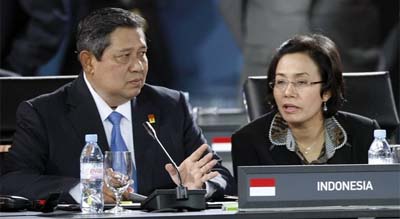A quote by the head of Indonesia’s National Council on Climate Change (DNPI), Agus Purnomo, seems to indicate that the announcement is not meant to become a legally binding commitment but rather Indonesia’s ‘own commitment as good citizens of the world’. Nevertheless, the announcement will earn Indonesia international attention, and is sure to raise expectations – as a statement from a large developing country, it could help towards progress at the Copenhagen climate conference and beyond.
A draft study by McKinsey for Indonesia’s National Council on Climate Change (DNPI), released in August, says that Indonesia’s total greenhouse gas emissions under business-as-usual are expected to reach 3.6 Gt CO2-equivalent in 2030 (2.8 Gt in 2020). That would be about 5 per cent of the global total. Of the 3.6 Gt in 2030 (2020 data is not available), 0.85 would be from forestry, 1.2 from peatlands, and most of the rest from power and transportation. The study suggests that the total could potentially be reduced by more than a third, with around 80 per cent of the reductions to come from forests and peat. The estimated incremental costs are quite low compared to current carbon prices in the EU and elsewhere.
Projections like these are no exact science of course, and in some respects they can be no more than educated guesses. Uncertainty is particularly large for the levels of deforestation and CO2 release that stems from it, as well as for CO2 from burning and oxidisation of peat soils. There is bound to be disagreement from technical experts and agencies about what the true numbers might be today, and even more so about how they might change over time: ‘business as usual’ is an elusive concept.
As to reduction potential, the key word in the description of the estimates is ‘potentially’. The McKinsey study serves a useful purpose. However, it does not venture into an analysis of how these reductions could actually be achieved, the types of policies and regulatory instruments that could be used, their interaction with existing policy settings, and their institutional feasibility. Technical and economic opportunity do not automatically translate into either effective policy formulation or effective market responses, shortfalls in infrastructure investment in Indonesia and elsewhere being a case in point.
The McKinsey estimates of abatement costs also are purely ‘technical’ – they do not include transaction costs, transfer payments that may be needed to make policies socially and politically acceptable, and so on. Actual costs could well be higher, in large part depending how well climate policies are designed and implemented.
The challenge for Indonesia’s policymakers is to put in place effective and efficient policies that support climate change objectives, with short term steps that lead in the direction of an effective and efficient longer-term policy platform. That requires a detailed understanding of what policy approaches can be taken to cut emissions, how they relate to overarching development goals and how they fit in with economic reform objectives, to what extent they attract investment and carbon financing, and how they affect the budget. Many advanced economies are also grappling with these issues.
Studies on these issues are underway in Indonesia, including a ‘Green Paper’ on climate change economics and policy options for Indonesia’s Finance Minister, with assistance by the Australian government. A study on sectoral climate change options is being prepared by Bappenas, the state planning agency. Both are due before the Copenhagen climate conference.
SBY’s G20 announcement certainly raises the urgency of understanding the domestic policy options. If the international community takes Indonesia at its word, then there will need to be a greater emphasis on policy development and implementation. A cut of 40 per cent relative to a hypothetical baseline by 2020 would, on McKinsey’s numbers, mean a cut in absolute emissions of around twice Australia’s total current emissions. Time to get serious about how it might be done.


It is an ambitious goal from a developing country and should be encouraged.
There is a strong momentum from the developing members in the G20, like Indonesia and China.
The world should act on climate change and energy efficiency and sustainability.
Well, it’s not a binding commitment. Should we encourage equally ambitious, non-binding commitments? I think not. Should we encourage binding equipments from countries with poverty problems and low emissions and power consumption. Indonesia’s current CO2 emissions per capita are 1.9 metric tonnes/capita compared to 12.5 in the high income OECD. Indonesia consumes 509 kWh/capita of energy compared to 9,792 in the high income OECD. McKinsey’s analysis is not much short of hubris. There is nothing about implementation difficulties; many costs are ignored or assumed to be picked up by donors; and more importantly what are they on about encouraging emission reductions from a country that already has its fair share of poverty ( would be more than 20% using the $1.50/day benchmark).